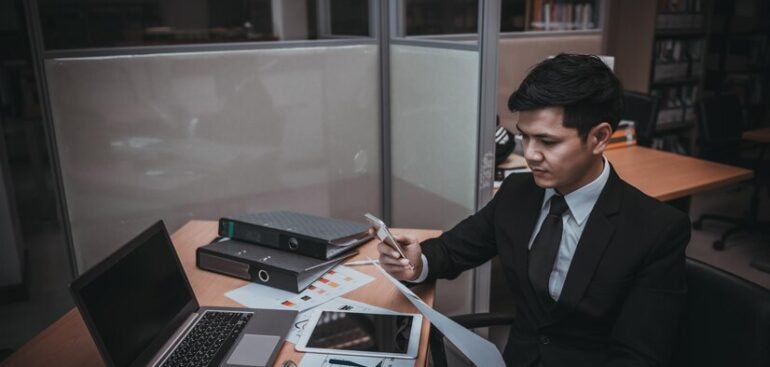Forensic Accounting Audit: Uncovering Financial Fraud and Ensuring Accuracy
Introduction
In today’s dynamic financial landscape, forensic accounting audits have become indispensable for businesses and individuals alike. As financial fraud continues to evolve, organizations are increasingly turning to forensic accounting to uncover discrepancies, identify fraud, and mitigate risks. A forensic accounting audit is not just about examining financial statements; it’s about digging deeper into the financial structure of an entity to identify irregularities and ensure compliance with legal and financial standards. With the stakes higher than ever, the role of forensic accounting audits extends beyond fraud detection to include prevention, litigation support, and overall financial health assessment.
Fraud can have devastating effects on businesses, including financial loss, reputational damage, and legal consequences. The expertise of forensic accountants provides a vital safeguard against such risks. Fraud Stoppers, a reputable name in the industry, offers tailored forensic accounting audit services to address these needs, enabling organizations to detect and prevent fraudulent activities efficiently. Whether you’re an individual suspecting mortgage fraud or a corporation aiming to enhance financial transparency, understanding the depth and application of forensic accounting audits can be the first step toward securing your financial future.
Contact us today at (877)-399-2995 or visit Mortgage Audits Online to learn more. Secure your financial future with confidence!
- Understanding Forensic Accounting Audits
Forensic accounting audits combine accounting expertise with investigative techniques to identify financial discrepancies. This specialized branch of accounting focuses on fraud detection, litigation support, and financial crime prevention. Unlike traditional audits, forensic accounting audits involve a detailed examination of records, contracts, and transactions to uncover fraudulent activities.
Defining the Scope
The scope of forensic accounting audits varies depending on the needs of the client. For businesses, this may include examining financial statements for anomalies, reviewing internal controls, and evaluating compliance with regulations. For individuals, it could involve analyzing bank statements, investment records, or mortgage documents. Fraud Stoppers specializes in identifying irregularities in mortgage transactions, providing clients with comprehensive reports to support legal claims.
The Importance of Forensic Accounting in Modern Business
The rise in financial fraud cases has highlighted the need for forensic accounting audits. Organizations today face a myriad of risks, from embezzlement and financial statement fraud to cybercrime. Forensic accountants help businesses navigate these challenges by providing actionable insights and ensuring financial integrity. By identifying potential fraud risks early, organizations can implement robust preventive measures, safeguarding their assets and reputation.
- Common Types of Financial Fraud Detected
Financial fraud takes many forms, each with unique challenges and implications. Understanding these fraud types is critical for effective detection and prevention.
Asset Misappropriation
This is one of the most common types of fraud and involves the theft or misuse of an organization’s assets. Examples include skimming cash, forging checks, or misusing company credit cards. Forensic accountants examine transaction records to identify inconsistencies that may indicate asset misappropriation.
Financial Statement Fraud
Manipulating financial statements to present a misleading picture of an organization’s financial health is another common fraud type. This can involve inflating revenues, understating expenses, or misclassifying assets. Forensic accounting audits delve into the details of financial statements to uncover such deceptive practices.
Mortgage and Loan Fraud
Mortgage fraud often involves falsified documents, inflated property values, or undisclosed liabilities. Fraud Stoppers provides specialized expertise in identifying mortgage fraud, helping clients reclaim losses and achieve justice. Forensic accountants examine loan agreements, payment records, and appraisal documents to detect fraudulent activities in this domain.
- The Role of Technology in Forensic Accounting Audits
Modern forensic accounting audits rely heavily on technology to identify and analyze financial discrepancies. With advanced tools and software, forensic accountants can uncover fraud more efficiently than ever before.
Data Analytics and Forensic Tools
Data analytics plays a pivotal role in forensic accounting audits. By analyzing large datasets, forensic accountants can identify patterns, anomalies, and trends indicative of fraud. Software tools such as IDEA, ACL, and Tableau enable efficient data analysis, ensuring no stone is left unturned.
Digital Forensics
With the rise of digital fraud, digital forensics has become an integral part of forensic accounting. This involves examining electronic records, emails, and digital transactions for signs of tampering or fraud. Fraud Stoppers employs cutting-edge digital forensic techniques to uncover hidden fraud in mortgage transactions and other financial activities.
Blockchain and Cryptocurrency Audits
The increasing use of blockchain and cryptocurrencies presents new challenges and opportunities for forensic accounting audits. Forensic accountants are now leveraging blockchain’s transparency to trace transactions and detect fraud, providing an additional layer of security in financial audits.
- Steps in Conducting a Forensic Accounting Audit
Conducting a forensic accounting audit involves a systematic approach to ensure accuracy and thoroughness. Each step is crucial in identifying and addressing financial discrepancies.
Planning and Scoping
The first step is to define the scope of the audit, including the areas to be examined and the objectives to be achieved. This involves discussions with stakeholders to understand their concerns and goals. Fraud Stoppers begins each audit by identifying the client’s specific needs, ensuring a tailored approach.
Data Collection and Analysis
Forensic accountants gather relevant financial records, including bank statements, invoices, contracts, and emails. Advanced analytical tools are used to scrutinize these documents, identifying patterns and anomalies that may indicate fraud.
Interviews and Investigations
Interviews with employees, stakeholders, and third parties provide valuable insights during a forensic accounting audit. These interviews help corroborate findings and uncover additional evidence. Fraud Stoppers emphasizes the importance of meticulous investigation to build a strong case against fraudulent activities.
Reporting and Litigation Support
The final step involves preparing a detailed report outlining the findings, conclusions, and recommendations. This report is often used in legal proceedings, providing essential evidence to support claims. Fraud Stoppers ensures that clients receive comprehensive reports tailored to their needs.
- The Benefits of Forensic Accounting Audits
Forensic accounting audits offer numerous benefits beyond fraud detection, making them a valuable tool for businesses and individuals.
Fraud Prevention and Risk Mitigation
One of the primary benefits of forensic accounting audits is the ability to prevent future fraud. By identifying weaknesses in internal controls, forensic accountants help organizations implement measures to mitigate risks.
Legal Support and Evidence
Forensic accounting audits provide critical evidence for legal cases, including fraud claims, contract disputes, and bankruptcy proceedings. Fraud Stoppers’ detailed reports have helped countless clients achieve favorable outcomes in court.
Enhanced Financial Transparency
A forensic accounting audit enhances transparency by providing a clear and accurate picture of an organization’s financial health. This builds trust among stakeholders and fosters a culture of accountability.
Reputation Management
Organizations that proactively address fraud and financial irregularities can protect their reputation and maintain public trust. Forensic accounting audits demonstrate a commitment to integrity and ethical practices, strengthening an organization’s credibility.
- Fraud Stoppers: Your Partner in Forensic Accounting Audits
Fraud Stoppers is a trusted leader in forensic accounting audits, offering tailored solutions to address the unique needs of clients. With a team of experienced forensic accountants and advanced tools, Fraud Stoppers provides unparalleled expertise in detecting and preventing financial fraud.
Specialization in Mortgage Fraud
Fraud Stoppers specializes in uncovering mortgage fraud, helping individuals and businesses identify discrepancies in loan agreements and transactions. By leveraging detailed analysis and industry knowledge, Fraud Stoppers ensures clients receive the justice they deserve.
Comprehensive Services
From fraud detection and prevention to litigation support and financial analysis, Fraud Stoppers offers a wide range of forensic accounting services. Each service is designed to provide actionable insights and protect clients from financial risks.
Client-Centric Approach
Fraud Stoppers prioritizes client satisfaction, offering personalized solutions and ongoing support. Their commitment to excellence has made them a trusted name in forensic accounting audits.
Conclusion
Forensic accounting audits play a vital role in ensuring financial integrity and protecting against fraud. By combining investigative expertise with advanced technology, forensic accountants uncover discrepancies, provide legal support, and enhance financial transparency. Organizations and individuals alike benefit from the insights and safeguards provided by forensic accounting audits. Fraud Stoppers, a leader in this field, offers comprehensive services to meet the diverse needs of clients, from fraud detection to litigation support.
As financial risks continue to evolve, investing in forensic accounting audits is more important than ever. Whether you’re seeking to protect your business, secure your finances, or uncover fraudulent activities, Fraud Stoppers is here to help. Contact us today at (877)-399-2995 or visit Mortgage Audits Online to learn more. Secure your financial future with confidence!







